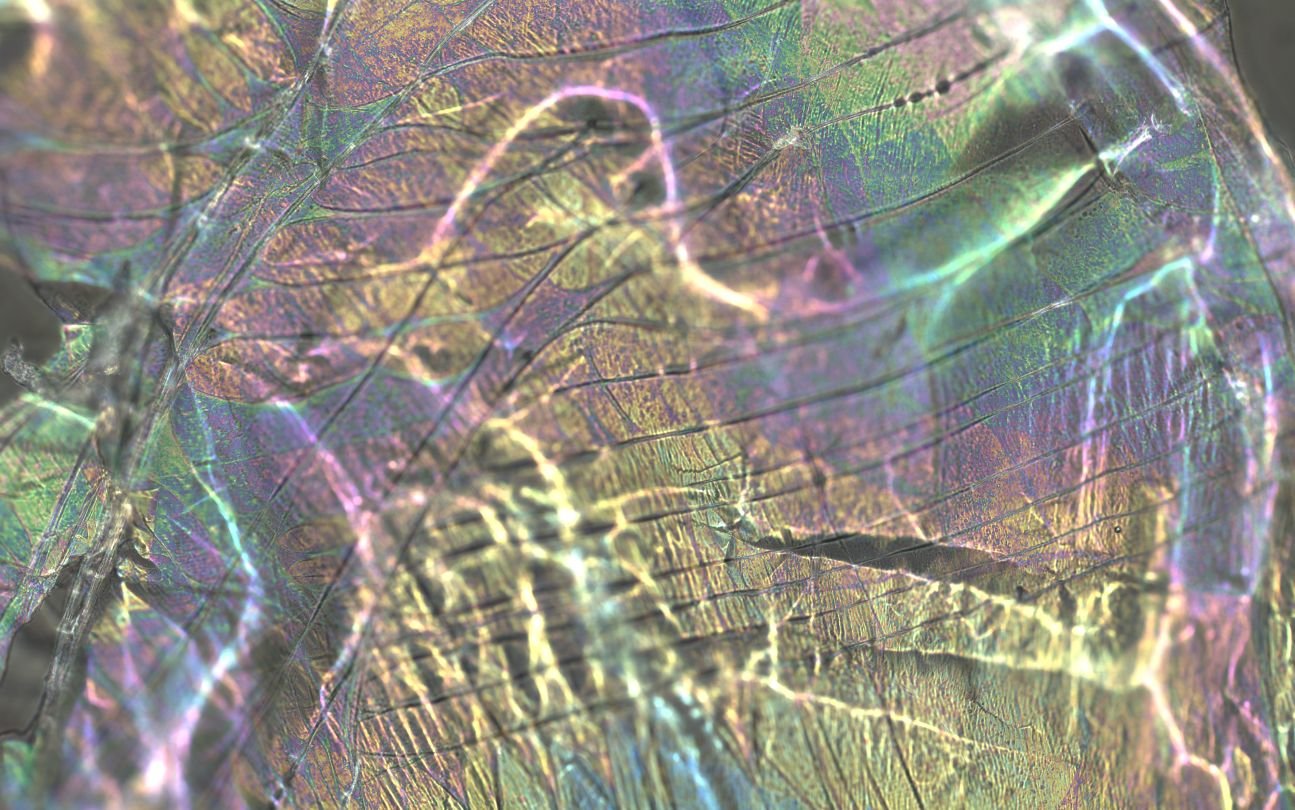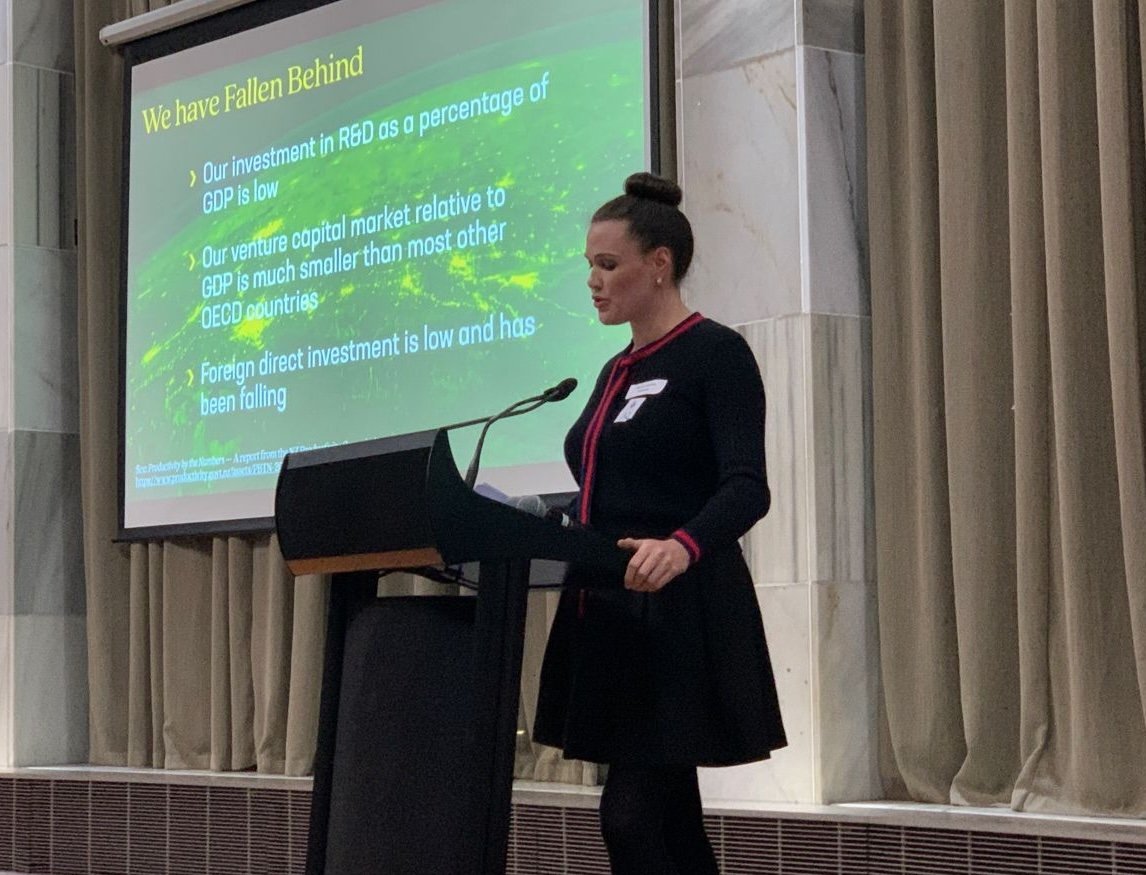Nature-Inspired Solutions for Global Environmental Health
In the effort to eliminate harmful synthetic substances from our environment, EHF Fellow Veronica Stevenson is not just raising awareness - she's creating a solution by harnessing ‘the genius of nature’.
Through her groundbreaking work with Humble Bee Bio, Veronica is producing biomaterials that offer novel bioactivities and sustainable drop-in alternatives to plastics used in a range of everyday products. Her mission is clear: to pave the way for a new era of climate-conscious innovation where nature-inspired solutions lead to improved global environmental health.
“That we allow known carcinogens, hormone disruptors, and pollutants in personal care products is a breach of the human right to life, liberty, and personal security. This is why I started Humble Bee Bio: to create effective and sustainable products at the industrial level instead of passing the burden onto consumers to be hyper-aware about what they’re putting in their bodies.”
Inspired by Curiosity and Nature
Veronica’s path to becoming a leader in Aotearoa NZ’s cleantech and biotech sectors is grounded in her family’s legacy of curiosity and connection to the natural world. Influenced by a lineage of strong businesswomen and environmental stewards, her passion for science and nature was nurtured from an early age. The legacy of her grandmother, a beekeeper and naturalist, played a role, while her mother’s influence created a thirst for knowledge. Veronica recalls:
“My mother was hugely influential. We were a curious family, and she created that culture of curiosity. We would spend a lot of time reading and regularly bring out the thesaurus, or Brewer’s Dictionary of Phrase and Fable, to look up an etymological root, how a phrase had developed, or where it was first coined.”
This intellectual environment was complemented by her father’s passion for history, which broadened her perspective.
“Dad studied Languages and History at Oxford; so as kids, he would tell us stories about the different layers of history in the UK. We would visit ancient ruins, castles, graveyards, and churches; this really shaped my interest in the wider world.”
Her strong foundation and interest in understanding complex systems led Veronica to pursue tertiary studies in science. During her degree in reproductive anatomy and structural biology, she encountered the issue of bioaccumulative substances - chemicals that disrupt fertility and hormone regulation. This exposure made her acutely aware of these harmful chemicals' detrimental environmental and health impacts, especially with their prevalence in everyday personal care products.
This realisation set Veronica on the course to finding natural alternatives for these harmful synthetic chemicals.
“I could see regulation on the horizon, and that’s when I started looking for things that existed in nature that had similar performance attributes for those being regulated out, that I’d learned about at university. I came across this family of bees, and that’s when I tried to find those bees and figure out how to study them.”
Starting & Scaling Humble Bee Bio
Humble Bee Bio grew from Veronica’s research on solitary bees and her vision to replace carcinogenic and hormone-disrupting chemicals in market products with biodegradable, bio-based alternatives inspired by the unique properties of the bees' nest material.
A SEM image of the cellophane-like nest material
Recognising that bees alone could not provide a scalable source of material, Veronica and her team turned to advanced techniques in bioinformatics, machine learning, and bioengineering. They successfully replicated some performance attributes of the bee's nest material, resulting in a novel, patent-pending protein platform with diverse applications.
The female bee makes a waterproof cellophane-like envelope
This innovation could potentially revolutionise the cosmetics, textiles, and biomedical industries, with total addressable markets worth over NZD $200 billion. By providing novel functionalities and safer alternatives that improve human health they are supporting a shift towards sustainable manufacturing practices; Veronica’s work exemplifies how deep tech can drive meaningful climate action and reshape industry standards.
Veronica explains:
“We’re creating novel biomaterials that solve market problems and improve global environmental health. The bee genome has given rise to multiple proteins and peptides that have functionality in different markets. We want to make sure that we’re providing those markets with safe, sustainable, biodegradable alternatives to current products, or new materials that are more effective than current ingredients that improve human health.”
The biomaterials developed by Humble Bee Bio may provide an alternative to synthetic, fossil fuel-based or bioaccumulative products, significantly reducing the environmental footprint of everyday personal care products. Veronica’s approach, grounded in biomimicry, demonstrates how nature-inspired innovations can replace harmful substances with safer, more sustainable options. She says:
“Biomimicry has been done for centuries at a macro scale. At a micro scale, it's about discovering and improving nature-derived chemicals or compounds in a non-extractive way.”
Raman image of bee nest material
Veronica's journey with Humble Bee Bio has been bolstered by support from Edmund Hillary Fellows. From investment to industry connections and now, working within the company’s team. Investment from Martin Krafft helped attract further funding and industry support from Gherzi Group, a global leader in textiles manufacturing. Arthur Brock has also invested, and more recently, Trevor Squier joined the company part-time as the Strategic Operations & Finance Lead. Veronica says:
“Trevor has networks and knowledge that are hugely valuable to us. He’s an exited founder, has a strong technical background and knows the venture finance market in the USA intimately.”
Advocacy for Systemic Change in Environmental Safety
Veronica’s focus on sustainability extends to advocating for a systemic shift in handling safety and environmental responsibility. She emphasises the need to move beyond burdening consumers to identify and avoid harmful chemicals. Instead, she advocates for proactive measures by regulators to prevent using dangerous substances. She states:
“The conversation needs to be shifted from asking the individual to protect themselves by making the right decision when a plethora of sophisticated greenwashing confronts them … That’s a big motivator for me; it fundamentally should not be up to the consumer to have to scrutinise and police while trying to prevent themselves from being poisoned, just to exist and use everyday products.”
Challenges and Opportunities for Aotearoa NZ’s Cleantech Sector
At the NZ Cleantech Report launch in May 2024, Veronica addressed several pressing challenges facing Aotearoa NZ’s deep tech sector. She pointed out the significant hurdles in securing early-stage funding, noting that investment in technical companies within the country is relatively limited, which has a big impact on the amount that can be raised, how fast companies can go and what they can achieve. These factors have Aotearoa NZ lagging behind other OECD countries. She stated how this funding gap highlights the need for enhanced infrastructure and capital investment to nurture and expand Aotearoa NZ’s cleantech sector.
Veronica presenting at Parliament during the launch of the NZ Cleantech Report
However, Veronica does see an opportunity for Aotearoa NZ to distinguish itself as a global leader in cleantech. She says:
“I think there’s an opportunity in NZ for cleantech to be something we’re known for, and that would be a point of difference. It can be something that achieves a lot of the larger ambitions that were set by the likes of Paul Callaghan in terms of creating high-value companies that are interesting and challenging, with compelling jobs.”
Veronica also highlighted the potential for the cleantech sector to embody Aotearoa NZ’s commitment to kaitiakitanga (guardianship) and align with the principles of te ao Māori (Māori worldview). She observed:
“I think there is an opportunity for us to align our industrial strategy with the praxis of kaitiaki and guardianship. NZ has a significant role to play globally. Owning and stepping into that role on an international stage is so grounded in the treasure of te ao Māori and the Treaty of Waitangi, and that is an opportunity in and of itself to embed, strengthen and solidify it globally. The mana of Aotearoa New Zealand is already felt in this regard, and this would strengthen it, and the ‘why’ we would have a cleantech sector and why that cleantech sector would be world-leading.”
Enabling Global Growth
Veronica explains that Humble Bee Bio is at an exciting inflexion point as it advances its product pipeline and broadens its market reach.
“Having proven the viability of our platform with multiple candidate peptides and proteins across various applications - from novel therapeutics to enhancing industrial fibres and films - Humble Bee Bio is now focused on accelerating the next stage of development.”
To achieve this, Veronica is scaling the team to drive the company’s technical innovation and strengthen its governance, as well as seeking strategic partnerships and opportunities:
“With promising new data in hand, Humble Bee Bio is initiating its next fundraising round and seeking investor connections to catalyse growth. The informal process has begun, with a formal approach set to start in mid-January 2025.”
Veronica also points out that as Humble Bee Bio evaluates which product candidates to advance, introductions to potential partners or experts in cosmetics formulations, precision fermentation manufacturing, and biomedical research will be key to guiding their decisions.
Veronica’s work with Humble Bee Bio illustrates the transformative potential of nature-inspired innovation in tackling urgent environmental and societal health challenges. By developing sustainable biomaterials that reduce reliance on harmful chemicals, she showcases how deep tech can foster a healthier planet and advance more responsible industry practices for future generations.
If you’re interested in knowing more or would like to support Veronica’s work, contact info@humblebee.co.nz





